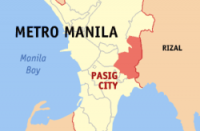MANDALUYONG, Philippines (Eagle News) — A suburb in Manila is helping self-confessed drug users turn over a new leaf by forcing them into a weekly dance exercise routine.
About 70 drug users, who had recently surrendered to the police in the suburb of Mandaluyong, were given an hour-long Zumba class as part of the local government’s unorthodox rehabilitation program.
Zumba is a dance fitness activity created by a Colombian dancer in the 1990s, involving aerobic exercises and dance choreography.
Drug agents lead the fitness class and make sure that every participant joins the exercise.
Those who skip the weekly lessons are paid a visit from the police and risk imprisonment.
The local government hopes the drug users will be able to turn their addiction towards a healthier lifestyle.
“If they are addicted to drugs, then why not get them addicted to sports or physical fitness. If we can get those to become their vices, then they will turn away from drugs,” Neil Zuniega, Police Officer and Fitness Trainer said.
Drug users will need to attend the classes in the next six months while being subjected to routine blood tests until they are deemed reformed.
One drug user says the Zumba classes help clear his mind.
The local government of Mandaluyong has been organizing fitness events for the past five years for local residents, but the classes specifically for drug users began only on July 1.
The Philippines has seen a massive crackdown on drugs since the inauguration of President Rodrigo Duterte, whose single-issue campaign against illegal drugs and crime has resonated with the voters.
Thousands of drug users in the Philippines have surrendered to the police after the death toll from drug enforcement operations increased following the May 9 polls, about which human rights groups have expressed concern.
In 2012 the United Nations said the Philippines had the highest rate of methamphetamine use in East Asia, and according to a U.S. State Department report 2.1 percent of Filipinos aged 16 to 64 uses the drug, which is known locally as “shabu”.







